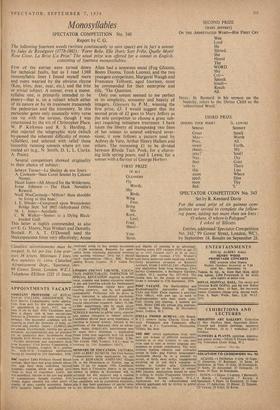The following fourteen words (written continuously to save space) are
in fact a sonnet by Jules de Ressiguier (1778-1862): 'Forte Belle, Elle Dort; Sort Frele, Quelle Mort! Rose Close, La Brise Ea Prise.' The usual prize was offered for a sonnet in English.
consisting of fourteen monosyllables. '
Elm, of the entries were turned down for technical faults, but as I read 1,988 monosyllabic lines I found myself more and more wearied by the obvious rhyme (Kiss, bliss; dear, near, etc.), and the trite or trivial subject. A sonnet, even a mono- syllabic one, is primarily intended to be poetry—that is, on a subject which either of its nature or by its treatment transcends the pedestrian and the transitory. In this particular genre only unusually witty verse can vie with the serious, though I was entertained by the wit of Christopher Place, W. P. Kirkman and R. S. Harding. I also rejected the telegraphic style (which by-passed the inherent difficulty of mono- syllables), and selected with relief those smoothly running sonnets where art con. coaled art (e.g.. N. Smith, D. L. L. Clarke. A. Praia).
Several competitors showed originality in their choice of subject :
Selwyn Turner—Le Shelley de nos Jours, A. Cookson—Suez Canal Sonnet by Colonel Nasser, Hazel Jones—All Aboard for the Wilderness. Joyce Johnson — The Hack Novelist's Reward.
Niall MacCarmaig—'Milton! thou shouldst he living at this hour.'
J. E. Hinder—Composed upon Westminster Bridge Sept. 3rd 1802 (dehydrated 1956), M. L. Jones—Accolade.
C. W. Walker—Sonnet to a Dying Black- headed Gull.
This latter is highly commended, as also are. F. G. Moore, Nan Wishart and Dorothy Bushell. 1', A. T. O'Donnell used the Shakespearean form very effectively; Annie
Allen had a sonorous sestet (Fog Glooms, Boom Dooms. Tomb Looms), and the two youngest competitors, Margaret Waugh and Francesca Tolhurst, aged fourteen, must be commended for their enterprise and title, 'The Question.'
Only one sonnet seemed to me perfect in its simplicity, economy and beauty of imagery, Cleaners by P. M., winning the first prize, £3. I would suggest that the second prize of £2 goes to Mary Jeffrey as the sole competitor to choose a great sub- ject requiring miniature treatment. I have taken the liberty of transposing two lines of her sonnet to amend awkward inver- sions; it now follows a pattern used by Aubrey de Vere, Arthur Henry Hallam and others. The remaining £1 to be divided between Rhoda Tuck Pook, for a charm- ing little spring poem. and I, Lewis, for a sonnet with a flavour of George Herbert.
FIRST PRIZE
(P. m.) GLEANERS Fly
Words, Shy Birds, Wing Free, Bring Me Root,
Leaf,. Fruit. Sheaf—
Your Store.
Stirred.
She Heard The WORD.
Shy Cry—
Speech
Small—
Reach All
NOTE: St Bernard, in his sermon on the Nativity, refers to the Divine Child as the 'abbreviated Word.'
THIRD PRIZE
(RHODA TUCK POOK) (I. LEWIS) SPRING
Greet May-- 'Pray, sweet cheat. stay!' Nay. fleet is
SONNET
Small Worth All Earth, My Soul! Thy Goal There Lies Where Dies Thy


































 Previous page
Previous page